THE 60th ANNIVERSARY OF THE 1955 ASIAN-AFRICAN CONFERENCE AND THE 10th ANNIVERSARY OF THE NEW ASIAN-AFRICAN STRATEGIC PARTNERSHIP
Overall Context
- We, the Leaders of the Asian-African Countries, gathered in Jakarta and Bandung, Indonesia on 22-24 April 2015, at the Asian-African Summit, on the occasion of the 60th Anniversary of the 1955 Asian-African Conference and the 10th Anniversary of the New Asian-African Strategic Partnership under the theme “Strengthening South- South Cooperation to promote World Peace and Prosperity1‘, in the spirit of revitalizing and enhancing our partnership.
- We meet in the midst of increasingly complex global challenges. We are cognizant that, in this context, our common efforts to deal with these challenges need to focus on prosperity, solidarity, and stability.
- We assert our belief that the Spirit of Bandung, including on self-determination, as enshrined in the Final Communiqué of the 1955 Asian-African Conference, remains solid, pertinent and effective as a foundation for nurturing stronger relations among Asian-African countries, and continues to provide guidance to resolve regional and global issues of common concern in accordance with the relevant principles of the Charter of the United Nations.
- We strive to continue the significant progress in various fields in Asian and African countries. In this context, we are encouraged by the integration of Pacific Small Island Developing States into the fold of Asian cooperation frameworks, and more importantly, their importance and growing role in overcoming global challenges.
- We underline the importance of bringing the regions closer together by utilizing the advantages derived from commonalities and diversity. We will further explore innovative and concrete ways and means to strengthen cooperation between Asia and Africa to contribute to regional and global peace and security as well as to promote economic cooperation and trade, to eradicate poverty and achieve sustainable development.
- We underscore the Declaration on the New Asian-African Strategic Partnership (NAASP) of 2005, as a framework to build a bridge and strengthen practical cooperation between countries of Asia and Africa, and reaffirm our commitment to redouble our efforts for its successful implementation, (n this regard, we endorse the 2015 Declaration on Reinvigorating the New Asian-African Strategic Partnership.
- We reaffirm the importance of South-South Cooperation as a manifestation of solidarity among Asian and African countries and a complement to, rather than a substitute, for North South cooperation. We further recognize that strengthening South-South Cooperation is mutually beneficial for both regions by serving their strategic interests and reflecting a new type of international relations featuring win-win cooperation.
Asia Africa Cooperation: The Way Forward Strengthening Political Solidarity
- We reaffirm the importance of building harmony among cultures, religions, faiths and civilizations. We commit to collectively combating violent extremism, racism, racial discrimination, xenophobia and related intolerance, while recognizing moderation as an important value in countering all forms of extremism, and to promoting dialogue, mutual respect, understanding and acceptance. We strive to make effective use of relevant regional and global mechanisms for this purpose, including through the UN Alliance of Civilizations and the Global Movement of Moderates (GMM), and other relevant initiatives such as “UN Declaration on A Culture of Peace”, “Dialogue among Civilizations” and “A world against violence and violent extremism”. In this regard, we recognize the important role of media and communication tools in combating all forms of extremism, and also the need to combat the misuse of these tools.
- We commit to advancing a constructive approach in the promotion and protection of all human rights and fundamental freedoms at relevant international fora based on the principles of universality, transparency, impartiality, objectivity and non-selectivity, respect for cultural values, in accordance with the 1993 Vienna Declaration and Programme of Action. In this regard, we will focus on constructive international dialogue and cooperation, capacity building and technical assistance to ensure the realization of ail human rights and fundamental freedoms – civil, political, as well as economic, social, and cultural rights – including the right to development. We underline the need to respect the right of people of every country to choose their own political systems, their leaderships and development paths suitable to their own national conditions.
- We remain committed to the principle of self-determination as set forth in the Final Communiqué of the 1955 Bandung Conference, and reiterated in Bandung Declaration on the New Asian-African Strategic Partnership on 24 April 2005 and in accordance with the Charter of the United Nations. In this regard, we reaffirm our principled and longstanding support for the inalienable rights of the Palestinian people to self-determination and the achievement of their legitimate national aspirations. To this end, we further reaffirm our continued commitment to assisting the empowerment of the Palestinian people, in preparing for and anticipating the eventuality of the independence of the Palestinian state.
- Giving priority attention to achieving solution to the Palestinian question as the core issue in the Arab-lsraeli conflict, we stress the importance and the need for the attainment of comprehensive and lasting peace and stability in the Middle East.
- We reiterate the central role of the United Nations in the achievement and maintenance of international peace and security, as well as advancement of common prosperity based on the purposes and principles contained in the Charter of the United Nations and the spirit enshrined in the Bandung Final Communique of 1955, in particular those relating to the respect for territorial integrity, sovereignty and political independence of States, refraining from the threat or use of force against the territorial integrity or political independence of States and non-interference in their domestic affairs. We also resolve to strengthening the role and capacity of regional and subregional organizations in the two continents in the peaceful settlement of disputes, conflict prevention and resolution, promoting political stability, as well as supporting efforts in peacekeeping, post-conflict reconstruction and peacebuilding in the two regions, through enhanced regional, South-South and triangular cooperation, in accordance with the principles of impartiality, consent of the parties, national ownership and leadership.
- We should strive to bolster endeavors to combat transnational organized crime activities and terrorism, including their increased linkages that adversely affect development, political stability, and social and cultural values, and thus reiterate the importance of close cooperation to respond to these threats.
- We reiterate our strong and unequivocal condemnation of terrorism in all its forms and manifestations and underline that we will not yield to terrorism. In this regard, we strive to strengthen international and regional cooperation to combat terrorism, and reaffirm the importance of implementing all pillars of the United Nations Global Counter-terrorism Strategy in an integrated and balanced manner, and relevant United Nations resolutions. We confirm that terrorism should not be associated with any religion, nationality, civilization or ethnic group.
- We express our strong opposition and condemnation to all unilateral coercive measures including sanctions which violate the Charter of the United Nations and undermine international law as well as the norms and principles governing peaceful relations among States.
Economic and Development issues
Also Read: MUI Warns Government of Risks Behind Proposed Stabilization Force Deployment to Gaza
- As we enter the dawn of the 21si century, we believe that our dynamic regions, representing 75% of the world’s population and 30% of global GDP, will play an ever- important role in international affairs. While Asian-African intra-regional trade and investment has yet to reach its full potential, we are encouraged that the overall numbers have steadily increased since our last meeting. We are determined to see this progress continue in a sustainable and equitable manner.
- We believe that trade and investment in the context of appropriate policies and rules can be important tools for economic development. We also note that the continuing global financial and economic crises have caused a decline in trade and investment growth, which has had a severe impact on many developing countries. In this regard, it is essential to establish and uphold a rules-based, open, development oriented, non-discriminatory and inclusive multilateral trading system that contributes to growth, investment, sustainable development and employment, particularly for developing and least developed countries.
- We underscore the significance of regional and bilateral trade arrangements, which ultimately strengthen and compliment the multilateral trading system beneficial to all, in particular developing and least developed countries.
- We reaffirm the need to advance the cooperation towards sustainable development in Asia and Africa, which is essential to the enhancement of stability and security in the two regions.
- We acknowledge that food security and nutrition, particularly in Asia and Africa, are of significant concern from a global perspective, in this regard, we further reaffirm our commitment to enhance food security and access to adequate, safe and nutritious food for present and future generations.
- We recognize that expanding access to modern, efficient and affordable energy services is an enormous challenge for the Asian and African regions, in this regard, we will strive to strengthen cooperation among relevant stakeholders in the two regions on more accessible, affordable, and sustainable sources of energy to meet their developmental needs.
- We realize the importance of the maritime sector and the strategic relevance of the Indian and the Pacific Oceans in bridging Asian and African economic advancement. In this regard, we reiterate the importance of upholding commitments under relevant international instruments and existing international and regional maritime organizations. We, therefore, underline the need to enhance existing cooperation and seek new opportunities and address challenges in the maritime sector between the two regions.
- We recognize the importance of reliable and sustainable infrastructure programs in every stage of national development, in particular in developing countries. Hence, we embrace knowledge, technology, finance as well as the skills and experience of enterprise, in order to promote and strengthen inclusive infrastructure collaboration based on each national interest and solidarity that Asian-African countries have.
- We recognize and support the role of value addition in promoting income generation, job creation and expanding the fiscal space for development financing, including social protection programmes, and eliminating poverty. In this context, we underline the need for giving priority to productive capacity building across the board in the most vulnerable countries.
- We also recognize that each country faces specific challenges to achieve sustainable development, and we underscore the special challenges faced by the most vulnerable countries, which include least developed countries, landlocked developing countries and Small Island Developing States, as well as the specific challenges faced by the middle-income countries and the countries in situations of conflict or emerging from conflict.
- We underscore the importance of analytical and statistical capacity, researches and technology transfer mechanism to all countries, particularly to developing countries which have special needs and challenges. We, therefore, commend Asian-African landlocked developing countries for the significant contribution to the realization of International Think Tank for Landlocked Developing Countries through acceding and becoming party to its Multilateral Agreement.
- We pledge to work together to formulate a strong, forward-looking, inclusive, and equitable post-2015 development agenda, which focuses on eradicating poverty and promoting sustainable development and inclusive economic growth. In this regard, we
call for strengthened Internationa! development cooperation including appropriate financing for the implementation of the agenda under the framework of global partnership. We also reiterate the importance of our enhanced cooperation under the 3rd International Conference for Financing for Development to be held in July 2015 in Addis Ababa.
- We are deeply concerned that developing countries, particularly least developed countries and small island developing states, are vulnerable to the adverse impact of climate change. We are calling for the effective and appropriate cooperation from all stakeholders at local, national, regional and global levels that fully respects the principles, provisions and objectives of the United Nations Framework Convention on Climate Change, in particular the principles of equity and common but differentiated responsibilities and respective capabilities in light of different national circumstances. In this regard, we welcome the 21st and 22nd Conference of the Parties to the UNFCCC (COP-21 and COP-22) that will be conducted in Paris and Marrakesh in 2015 and 2016, respectively.
- We reaffirm the importance of tourism to economic growth and development and improvement of quality of life of peoples in Asian and African countries. We encourage countries of the two regions to strengthen cooperation in sustainable tourism development and empower community-based tourism through technical assistance and sharing of knowledge. We condemn the poaching of wildlife and support the ban on illegal trade in wildlife products.
- We welcome the convening of the Asian-African Business Summit in Jakarta on 21 April 2015 in strengthening closer economic ties between the private sectors of Asia and Africa. We call for the strengthening of engagement of the private sectors in advancing cross-regional trade and investment.
- We believe that enhanced connectivity within and between the two regions will contribute to development of Asia and Africa. Thus, we are committed to enhancing cooperation in the fields of trade, logistics, investment and transportation.
- We underscore the importance to work towards promoting safe, sound and orderly migration through mutually beneficial cooperation agreed upon among countries of origin, transit and destination.
Social and Cultural Relations
- We underline the importance of closer international collaboration and coordinated responses to combat epidemics and communicable and infectious diseases. We strive to strengthen cooperation among Asian-African countries to overcome these challenges. We support the implementation of Universal Health Coverage (UHC) to improve access to health services, social safety nets and health security of the people.
- We reaffirm the importance of promoting democratic values. While acknowledging there is no single model of democracy, we are committed to forging cooperation in strengthening democratic institutions built on peoples’ aspiration. We, therefore, underline the importance of strengthening democracy through dialogue and cooperation.
- We stress the importance of strengthening people to people contacts by facilitating and encouraging interaction and exchange among youth, women, business, intellectuals, scholars, experts, athletes, artists, and media of the two regions.
- We are determined to promote cooperation on gender equality and women empowerment, and vulnerable groups, particularly on the issues of better access to education, healthcare and employment opportunities, in order to increase their participation in all spheres of life.
- We emphasize the importance to promote and strengthen disaster risk reduction, including preparedness, as well as response and early recovery efforts, and in this regard, underscore the need to strengthen the capacities at all levels, particularly at the iocal level. In response to the affected countries’ request, we strive to enhance international cooperation in support of their efforts in ail phases of humanitarian assistance, while acknowledging that the affected country has the primary responsibility in the initiation, organization, coordination and implementation of humanitarian assistance within its territory. 60th Commemoration of the Asian-African Conference
- We express appreciation to the Government of the Republic of Indonesia for hosting the 60th Commemorative Asian African Conference. On this auspicious occasion, we solemnly pay tribute to the former leaders of the Asian and African countries for their vision, leadership and dedication to strengthen and promote a more peaceful and equitable world order.
- We welcome the decision made by the Government of the Republic of Indonesia to establish an Asian-African Center in Indonesia that serves as an institutional support base of the New Asian-African Strategic Partnership. Participation of other Asian and African countries is encouraged in this regard.
- We acknowledge the “Bandung declaration of a human rights city”, as signed by the Mayor of Bandung on 2 April 2015. We also declare Bandung as the capital of Asian- African solidarity.
- We declare April 24th as Asian-African Day to celebrate Asian-African solidarity, cooperation and partnership to promote world peace and prosperity.
Concluded in Bandung, Indonesia, on the twenty-fourth day of April in the year two thousand and fifteen, in conjunction with Commemoration of the Sixtieth Anniversary of the 1955 Asian-African Conference. (P008/R03)
Also Read: Prof. El-Awaisi: The Mandate to Liberate Al-Aqsa Began at Prophethood
Mi’raj Islamic News Agency (MINA)





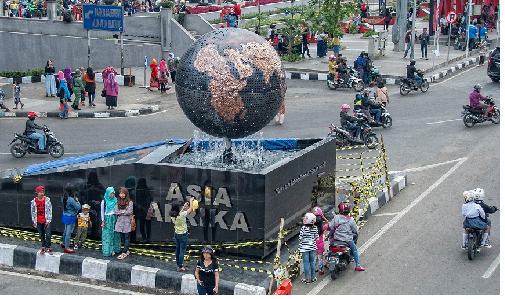




![Israeli tanks and APC’s gather by the Israeli – Lebanese border. Amid Israel’s escalating campaign against Hezbollah in Lebanon on September 30, 2024. [Erik Marmor/Getty Images]](https://en.minanews.net/wp-content/uploads/2024/10/IMG_20241001_203226-300x197.jpg)




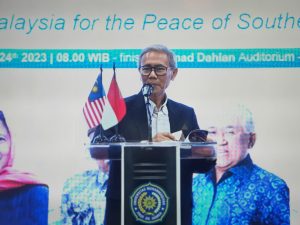

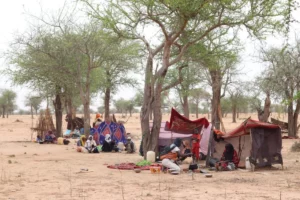
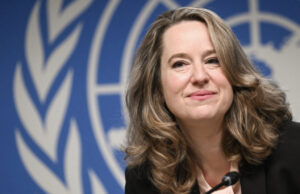

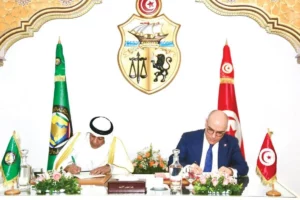







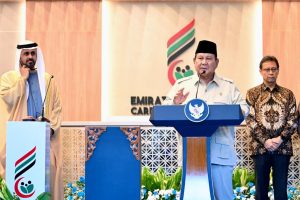





 Mina Indonesia
Mina Indonesia Mina Arabic
Mina Arabic